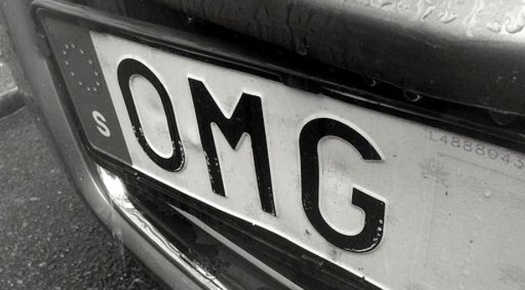
In 2016, Ben Hart, an atheist from Kentucky, filed a lawsuit after the head of Kentucky's Division of Motor Vehicles rejected his request to get a license plate reading "IM GOD." The presiding judge rejected the state’s argument to dismiss the lawsuit stating the case would have to be resolved on its merits. Ben Hart previously had this license plate in Ohio where he lived, and there were no incidents. But when he tried to get the same license plate in Kentucky he was rejected, because according to Kentucky's DMV, the plate message was “obscene or vulgar.” Later they changed their mind and stated that the plate was "not in good taste".
The lawsuit challenges some of the regulations governing personalized license plates as unlawful; specifically those that allow government officials to deny plates based on notions of "good taste", as well as those that deny plates which communicate religious, anti-religious or political messages. Responding to the lawsuit, the state argued that the Kentucky transportation secretary is immune from a lawsuit and that the case should be dismissed because personalized plate messages are “government speech.”
The American Civil Liberties Union of Kentucky and the Freedom From Religion Foundation (FFRF) attorneys — who filed a lawsuit on behalf of Hart — stated that the First Amendment of the United States Constitution was violated. As Patheos reports, Hart's attorneys argued that government was effectively taking a position on religion.
“Under the First Amendment, government officials do not have the authority to censor messages simply because they dislike them,” says ACLU Kentucky Legal Director William Sharp. “And in this instance, personalized license plates are a form of individual speech equally deserving of First Amendment protection.”
“Hart has a right to select a personalized plate message that reflects his philosophical views, just as any other driver may select an individual message for their personalized plate,” says FFRF Staff Attorney Patrick Elliott. “Just as others may select religious messages, Ben Hart, an atheist, has a right to comment on religion.”
Kentucky already had an option for citizens to buy a license plate template with the phrase “In God We Trust”, and if this is a case than there is no reason for them to deny Hart's request. If Kentucky allows religious messages on license plates then there is no valid argument to deny plates that send a different message. The lawsuit was filed in order to protect freedom of speech guaranteed by the First Amendment. And now, as the case moves forward, Hart and his team are one step closer to achieving this.
“Mr. Hart’s personalized plate request was denied based on reasons we believe violate the First Amendment of the United States Constitution,” says ACLU Kentucky Attorney Heather Gatnarek. “We’ll be making that argument to the court as the case moves forward.”
Photo Credits: Techflier
